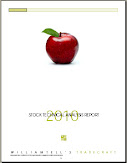Even, the threat of O'Bama... whatever "they" say he is/was going to do, isn't enough to boost demand for weapons of personal, convenient and ultralight mass destruction.
Smith & Wesson 4Q Falls 64% On Higher Expenses, Charges
Smith & Wesson Holding Corp.'s (SWHC) fiscal fourth-quarter profit slid 64% as higher overhead expenses and acquisition-related charges masked higher sales and margins.
Still, shares rose 5% to $4.30 in after-hours trading, as the results topped expectations.
But the gun maker also projected total revenue of $92 million to $96 million for the current quarter, with firearms contributing $75 million to $78 million and perimeter security making up the rest. That view fell short of the $101 million total Wall Street had expected, according to a poll by Thomson Reuters.
For the full year, total sales are expected to be $430 million to $445 million, generally higher than analysts' view of $431 million, with firearms sales expected to total $355 million to $365 million.
Smith & Wesson's shares jumped earlier this week after the U.S. Supreme Court said the right to bear arms is a fundamental right that states are bound to protect, in a ruling that was certain to lift enthusiasm for gunmakers. Gun control legislation and election results only partially impact the company, as a third of its sales are to police and other professionals.
President and Chief Executive Michael Golden said although the period of heightened consumer demand subsided at the end of the company's fiscal year, Smith & Wesson was able to grow firearm sales, supported by a broad product portfolio that was strengthened by new products. Diversification through the company's acquisition of Universal Safety Response last year also helped results, Golden said.
For the quarter ended April 30, Smith & Wesson posted a profit of $2.7 million, or 4 cents a share, down from $7.4 million, or 14 cents a share, a year earlier. The latest quarter included 4 cents of acquisition-related charges. Analysts expected an adjusted profit of 4 cents.
Net sales climbed 4.3% to $103.8 million, above the company's downbeat March forecast of $97 million to $101 million.
Gross margin widened to 31.3% from 31.1%.
Firearms sales were down 9.3%, falling from a stellar quarter a year ago when industry wide firearm sales peaked following the inauguration of President Barack Obama. Perimeter-security sales were up 25% at $13.6 million, although the result was under the company's expectations, primarily due to one customer's deferral of a significant order into future quarters, and generally longer sales cycles.
-By John Kell, Dow Jones Newswires; 212-416-2480; john.kell@dowjones.com














 AFP/Getty Images
AFP/Getty Images








